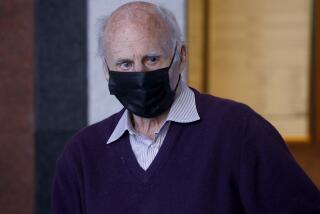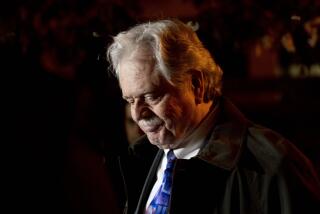Padilla is fit to stand trial, judge rules
- Share via
MIAMI — Suspected Al Qaeda operative Jose Padilla is competent to stand trial on terrorism charges because he understands the case against him and has already shown himself capable of assisting in his own defense, a federal judge ruled Wednesday.
The decision by U.S. District Judge Marcia Cooke was a victory for the government, which has alleged in a three-count indictment that Padilla was part of a North American terrorist cell that recruited, trained and supported Islamic militants seeking to carry out acts of violence.
Anthony Natale, lead attorney on Padilla’s four-man public defender team, had argued a few hours earlier at the conclusion of a four-day hearing that Cooke should find his client unfit to proceed. Natale urged Cooke to send Padilla to a mental hospital where he could be treated for what the defense called debilitating anxiety and post-traumatic stress disorder.
The defense had contended that Padilla, a 36-year-old former Chicago gang member, was mentally damaged by the 3 1/2 years he was held without charges at the Navy brig in Charleston, S.C. The lawyers say Padilla was deprived of human contact and subjected to dehumanizing stresses that amounted to torture.
Cooke prefaced her ruling by saying she might conduct another hearing on the torture allegations before Padilla’s trial, set to begin April 16. The defense has moved for dismissal of the case on the grounds of “outrageous government conduct” during Padilla’s time in the brig.
“That discussion is for another day,” she said of the allegations of mistreatment. She also said her ruling Wednesday did not prejudice her potential consideration of Padilla’s brig experiences.
The judge pointed to the October 2006 defense motion detailing the alleged abuses in military custody as evidence that the defendant comprehends the legal proceedings and can provide his lawyers meaningful information when he wants to.
“This defendant clearly has the capacity to assist his attorneys,” she said. “He had to communicate something to his lawyers in order for counsel to file that motion.”
She also appeared to fault Padilla for failing to cooperate fully with three mental health professionals who attempted to conduct mental fitness tests. Two experts hired by the defense diagnosed Padilla with post-traumatic stress disorder, but the court-ordered psychological evaluator said the defendant was fit for trial and that any failure to collaborate with his lawyers was “volitional.”
Padilla, in tan cotton prison garb, sandals and shackles, stood impassively as Cooke read her decision. He shook hands with Natale and gave him a rueful smile.
Neither the defense nor the prosecution would comment on the ruling or predict the next step in the complicated case. But one assistant U.S. attorney was overheard saying to another as they boarded an elevator: “One down, about 52 to go.”
Padilla, a U.S. citizen of Puerto Rican ancestry who converted to Islam during a previous prison sentence, was arrested at Chicago’s O’Hare International Airport in May 2002, when he returned from at least six years abroad, including time in Egypt, Pakistan and Afghanistan.
Then-Atty. Gen. John Ashcroft accused Padilla of being part of a plot to detonate a radioactive “dirty bomb” in a U.S. city. President Bush declared Padilla an “enemy combatant,” and Padilla was sent to the brig where he reportedly endured months of sensory deprivation followed by alternating extremes of light and darkness, silence and noise.
As the U.S. Supreme Court was pondering a ruling on the extent of the president’s powers to hold a U.S. citizen indefinitely without charges, the government indicted Padilla on charges of conspiracy and material support to terrorism in November 2005. He was transferred two months later from the brig to the federal court system.
There has been no mention of the dirty bomb accusation in the civilian court procedures.
*
More to Read
Sign up for Essential California
The most important California stories and recommendations in your inbox every morning.
You may occasionally receive promotional content from the Los Angeles Times.











